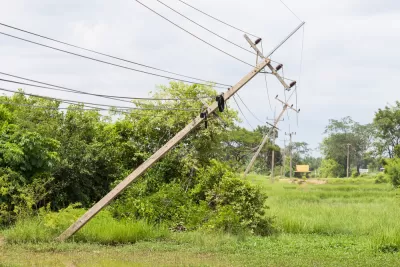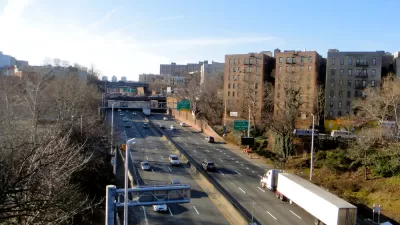The challenges of bridging the digital divide are exacerbated by the racist legacies of previous infrastructure systems, according to a recent presentation to the New York Regional Plan Association.

Emily Thenhaus shares a dispatch from the 2016 Regional Plan Association Assembly—specifically from a session about bridging the gap in digital access in the New York region.
Among the presenters during the session was New York City Counsel to the Mayor Maya Wiley, who highlighted the systematic roots of the digital divide. According to Wiley, the broadband system is being built on top of a deliberately discriminatory phone system. The following is taken directly from Wiley's presentation:
When I was in the U.S. Attorney’s office, when the Telecommunications Act of 1996 was being debated, actually civil rights groups including the NAACP, including La Raza were already working on the fact that the telephone system itself had actually redlined communities of color and that everyone understood the infrastructure was going to follow a lot of that proprietary infrastructure that was telephone lines to go to a more advanced form of technology that was going to get us to broadband.
So literally, without necessarily having racial intent to discriminate, because we are building on top of a discriminatory infrastructure, we are reinforcing over and over again that discrimination that happened decades before.
Thenhaus's article includes a full audio recording of the panel, which included BetaNYC Executive Director Noel Hidalgo, Newark Chief Information Officer Seth Wainer, Counsel to the Mayor or New York City Maya Wiley, and Knight Foundation Director of Community and National Strategy Benjamin de la Peña as moderator.
FULL STORY: Wiley: ‘…We are building on top of a discriminatory infrastructure’

Planetizen Federal Action Tracker
A weekly monitor of how Trump’s orders and actions are impacting planners and planning in America.

Map: Where Senate Republicans Want to Sell Your Public Lands
For public land advocates, the Senate Republicans’ proposal to sell millions of acres of public land in the West is “the biggest fight of their careers.”

Restaurant Patios Were a Pandemic Win — Why Were They so Hard to Keep?
Social distancing requirements and changes in travel patterns prompted cities to pilot new uses for street and sidewalk space. Then it got complicated.

Platform Pilsner: Vancouver Transit Agency Releases... a Beer?
TransLink will receive a portion of every sale of the four-pack.

Toronto Weighs Cheaper Transit, Parking Hikes for Major Events
Special event rates would take effect during large festivals, sports games and concerts to ‘discourage driving, manage congestion and free up space for transit.”

Berlin to Consider Car-Free Zone Larger Than Manhattan
The area bound by the 22-mile Ringbahn would still allow 12 uses of a private automobile per year per person, and several other exemptions.
Urban Design for Planners 1: Software Tools
This six-course series explores essential urban design concepts using open source software and equips planners with the tools they need to participate fully in the urban design process.
Planning for Universal Design
Learn the tools for implementing Universal Design in planning regulations.
Heyer Gruel & Associates PA
JM Goldson LLC
Custer County Colorado
City of Camden Redevelopment Agency
City of Astoria
Transportation Research & Education Center (TREC) at Portland State University
Camden Redevelopment Agency
City of Claremont
Municipality of Princeton (NJ)





























